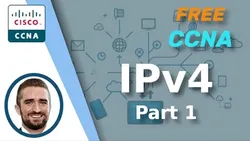
Free CCNA IPv4 Addressing (Part 1) Day 7 CCNA 200-301 Complete Course 
This course provides an introduction to the OSI Model and Network Layer, as well as an introduction to routing and IPv4 Addresses. It also covers the Decimal and Hexadecimal number systems, and provides practice in converting between Binary and Decimal numbers. This course is ideal for those looking to gain a better understanding of IPv4 Addressing. ▼
ADVERTISEMENT
Course Feature
![]() Cost:
Cost:
Free
![]() Provider:
Provider:
Youtube
![]() Certificate:
Certificate:
Paid Certification
![]() Language:
Language:
English
![]() Start Date:
Start Date:
On-Demand
Course Overview
❗The content presented here is sourced directly from Youtube platform. For comprehensive course details, including enrollment information, simply click on the 'Go to class' link on our website.
Updated in [February 21st, 2023]
This course provides an introduction to the OSI Model and Routing, as well as an in-depth look at IPv4 Addressing. Topics covered include the IPv4 Header, IPv4 Addresses, Decimal and Hexadecimal review, Binary number system, Binary to Decimal conversion practice, Decimal to Binary conversion practice, IPv4 Address Classes, Loopback Addresses, Netmasks, Network Address, and Broadcast Address. The course also includes a series of quizzes to test the student's understanding of the material.
[Applications]
After completing this course, participants can apply their knowledge of IPv4 addressing to configure and troubleshoot networks. They can also use the knowledge gained to design and implement IPv4 addressing schemes for networks. Additionally, they can use the skills acquired to identify and resolve network issues related to IPv4 addressing.
[Career Paths]
1. Network Engineer: Network Engineers are responsible for designing, implementing, and maintaining computer networks. They must be knowledgeable in a variety of technologies, including routing, switching, and security protocols. Network Engineers must also be able to troubleshoot network issues and provide technical support. The demand for Network Engineers is increasing as businesses rely more heavily on technology and the need for secure networks grows.
2. Network Administrator: Network Administrators are responsible for managing and maintaining computer networks. They must be knowledgeable in a variety of technologies, including routing, switching, and security protocols. Network Administrators must also be able to troubleshoot network issues and provide technical support. The demand for Network Administrators is increasing as businesses rely more heavily on technology and the need for secure networks grows.
3. Network Security Analyst: Network Security Analysts are responsible for designing, implementing, and maintaining secure networks. They must be knowledgeable in a variety of technologies, including routing, switching, and security protocols. Network Security Analysts must also be able to troubleshoot network issues and provide technical support. The demand for Network Security Analysts is increasing as businesses rely more heavily on technology and the need for secure networks grows.
4. Network Architect: Network Architects are responsible for designing, implementing, and maintaining computer networks. They must be knowledgeable in a variety of technologies, including routing, switching, and security protocols. Network Architects must also be able to troubleshoot network issues and provide technical support. The demand for Network Architects is increasing as businesses rely more heavily on technology and the need for secure networks grows.
[Education Paths]
1. Bachelor of Science in Computer Science: This degree path focuses on the fundamentals of computer science, such as programming, software engineering, and computer architecture. It also covers topics such as artificial intelligence, data structures, and algorithms. This degree path is becoming increasingly popular as technology advances and more businesses rely on computer systems.
2. Bachelor of Science in Information Technology: This degree path focuses on the application of technology to solve business problems. It covers topics such as database management, network security, and web development. This degree path is becoming increasingly popular as businesses rely more heavily on technology to manage their operations.
3. Master of Science in Computer Science: This degree path focuses on advanced topics in computer science, such as machine learning, distributed systems, and computer vision. It also covers topics such as software engineering, artificial intelligence, and data mining. This degree path is becoming increasingly popular as technology advances and more businesses rely on computer systems.
4. Master of Science in Information Technology: This degree path focuses on the application of technology to solve business problems. It covers topics such as database management, network security, and web development. This degree path is becoming increasingly popular as businesses rely more heavily on technology to manage their operations.
Course Provider

Provider Youtube's Stats at AZClass
Discussion and Reviews
0.0 (Based on 0 reviews)
Explore Similar Online Courses

How to Build a FPV Quadcopter: Part 1

PERN Stack Course - Postgres Express React and Node

Python for Informatics: Exploring Information

Social Network Analysis

Introduction to Systematic Review and Meta-Analysis

The Analytics Edge

DCO042 - Python For Informatics

Causal Diagrams: Draw Your Assumptions Before Your Conclusions

Whole genome sequencing of bacterial genomes - tools and applications

CCNA (Cisco Certified Network Associate) Course

Packet Tracer labs for the CCNA 200-301 exam: Practical labs


Start your review of Free CCNA IPv4 Addressing (Part 1) Day 7 CCNA 200-301 Complete Course